OCD治疗的几个问题(江西郭中孟)
阿立哌唑增效治疗难治性老年抑郁症的疗效和耐受性

阿立哌唑增效治疗难治性老年抑郁症的疗效和耐受性发表时间:2012-03-23T16:16:07.083Z 来源:《心理医生》2011年6月(上)总第193期供稿作者:俞丽华胡斌郭中孟张咏梅刘桥生[导读] 药物治疗老年期非精神病性抑郁症对改善症状具有一定疗效。
俞丽华胡斌郭中孟张咏梅刘桥生(江西省精神病院江西南昌 330029) 【摘要】目的:探讨阿立哌唑作为增效剂,治疗难治性老年期抑郁症的有效性及安全性。
方法:选择经艾司西酞普兰治疗16周,随后加用文拉法辛(最高量225 mg/d治疗12周)治疗,仅部分有效(HAMD17得分11-15分)或无效(HAMD17>15)的患者24例,年龄均在65岁以上(平均年龄73.9岁),患者再接受阿立哌唑增效治疗(剂量为2.5-15mg/天),治疗12周,采用HAMD17抑郁量表,UKU副反应量表,BSI焦虑量表,分别在治疗前及治疗后第1,4,8,12周末各评定一次,并进行对比分析。
结果:有19名患者完成了为期12周的阿立哌唑增效治疗研究,其中12/24(50%)达到了缓解的标准,HAMD17减分显著(为6.4±5.8),(平均配对t检验,p<0.01)。
2/24因为副反应(镇静和静坐不能)而脱落。
结论:以SSRI 和SNRI类药物治疗的老年抑郁症患者,未获得完全疗效时,使用阿立哌唑作为增效剂治疗,抑郁症状改善显著,耐受性良好。
【关键词】阿立哌唑;不完全缓解;老年期抑郁症;增效剂Use of Aripiprazole for Incomplete Response in Late-Life Depression Yu Lihua,Hu Bin,Guo Zhongmeng,Zhang Yongmei,Liu Qiaosheng 【Abstract】 Objective:To determine the feasibility and safety of aripiprazole augmentation for incomplete response to sequential SSRI and SNRI pharmacotherapy in late-life depression. Methods: 24 patients aged 65 and above (mean age 73.9) diagnosed with MDD who responded partially (Hamilton Depression Scale [HAMD, 17-item] score of 11–15) or not at all (HRSD >15) to a 16-week trial of escitalopram, followed by venlafaxine up to 225 mg/d for 12 weeks) received 2.5–15 mg/day of adjunctive aripiprazole (average dose 9.0 mg) for 12 weeks. The Hamilton Depression Scale(HAMD), UKU Side Effect Rating Scale(UKU), Brief Symptom Inventory- Anxiety subscale(BSI)were used to assess the therapeutic effect and side effect respectively. Results:Nineteen of 24 (79%) patients completed all 12 weeks of augmentation with aripiprazole, and 12/24 (50%) met criteria for remission . Hamilton depression scores showed a significant decrease during exposure to aripiprazole (6.4±5.8)(p<0.01). 2/24 (8%) discontinued due to side effects (one each: sedation, akathisia).Conclusion:In older adults with MDD with incomplete response to SSRI and SNRI pharmacotherapy, aripiprazole was well tolerated, and symptoms of depression improved significantly during treatment with aripiprazole. 【Keywords】 aripiprazole, incomplete response, late-life depression 【中图分类号】R749.4+1【文献标识码】A【文章编号】1007-8231(2011)06-0124-03 药物治疗老年期非精神病性抑郁症对改善症状具有一定疗效,但是仍旧约有50%的老年抑郁症患者使用抗抑郁药物治疗症状改善不足。
郭氏七损八益诊疗法_笔记

《郭氏七损八益诊疗法》读书札记目录1. 郭氏七损八益诊疗法概述 (2)1.1 郭氏七损八益理论的起源和发展 (3)1.2 郭氏七损八益诊疗法的基本内容和特点 (4)1.3 郭氏七损八益诊疗法在中医临床中的应用 (5)2. 郭氏七损八益诊疗法的理论基础 (6)2.1 阴阳五行学说 (7)2.2 脏腑经络学说 (9)2.3 气血津液学说 (10)2.4 病因病机学说 (11)3. 郭氏七损八益诊疗法的具体应用 (12)3.1 诊断方法 (14)3.2 治疗原则 (15)3.3 治疗方法 (16)3.4 药物应用 (17)4. 郭氏七损八益诊疗法的实践案例分析 (18)4.1 案例一 (20)4.2 案例二 (20)4.3 案例三 (22)4.4 案例四 (23)5. 郭氏七损八益诊疗法的现代研究与发展 (24)5.1 郭氏七损八益诊疗法的现代理论研究 (25)5.2 郭氏七损八益诊疗法的现代临床应用研究 (26)5.3 郭氏七损八益诊疗法的创新与发展 (28)6. 结论与展望 (29)6.1 郭氏七损八益诊疗法的优势与不足 (30)6.2 对郭氏七损八益诊疗法的展望 (32)1. 郭氏七损八益诊疗法概述《郭氏七损八益诊疗法》是一部融合了深厚中医理论精髓与临床实践经验的经典医著。
本书之所以成为中医学领域的瑰宝,在于其详尽阐述了郭氏七损八益诊疗法的核心原则与实施方法,为后学提供了一门既具系统性又具操作性的中医诊治技术。
尤其在当代医学背景下,反思传统与现代医学的结合,本书无疑具有不可替代的价值。
该书开篇从中医哲学的角度讨论了生命体与自然界之间的奇妙联系,指出了“天人合一”的中医核心理念,这为读者提供一个宏观理解人体健康的视角。
接下来深入人心的是对七损八益理论的详细解析,七损包括损气、损阴、损阳、损精、损神、损志、损形等七种对健康不利的状态或损害机制;而八益则是包括养生之气、养阴、养阳、补精、安神、顺志、全形等八种促进健康的措施和方法。
精神分裂症诊断和治疗新理念

3
概述(2)
20世纪80年代以来的30多年,分子遗传 技术 ;神经生化,生理,精神药理学; CT、MRI、PET等脑影相技术以及组织 病理学等新理论新技术在分裂症病因学 研究中的广泛应用,使人们对分裂症的 认识从临床现象学水平提高到分子水平 ,对分裂症本质的认识得以逐步深入。
12
病因与发病机制-遗传学(3)
实验遗传学研究(连锁与关联分析/基因 组扫描)
连锁研究发现了基本涵盖所有染色体的区域
候选基因研究发现了包括COMT、DISC1 、BDNF 等数十个基因为易感基因
13
病因与发病机制-遗传学(4)
14
病因与发病机制-遗传学(5)
遗传和环境的 相互作用
精神分裂症
15
7
概念的历史回顾(2)
E.Bleuler(瑞士,1911):首次提出精神分裂症概 念,核心问题是人格的分裂。
“4A症状”是基本症状:
Association disorder
Apathy
Ambivalence
Autism
幻觉妄想是附加症状
★长时间在美国精神医学界占据主导地位,然而,4A症状
较难界定和把握,实际操作性差,致使其实用性大打折
扣。
8
概念的历史回顾(3)
法国学者K.Schneider提出首级症状(first-rank symptoms), 强调症状在诊断中的重要性 3项幻听:思维化声;争论性幻听;评论性幻听 7项自我意识:思维被夺;思维被插入;思维被广播或扩散; 被强加的情感;被强加的冲动;被强加的意志行为;躯体被 动体验 1项原发性妄想:妄想性知觉 ★强调阳性症状,操作性强,具有较好实用性,缺点是其他精 神障碍(如双相障碍)的出现率也高达10%~20%
双相障碍的个体化治疗郭中孟20160409

二、双相障碍的诊治现状
? 60%有双相症状的患者在初次发作的 6个月内未得 到治疗
? 35%的双相障碍患者在首发症状后的 10年内都未 寻求治疗
2020/4/24
9
2020/4/24
10
2020/4/24
11
2020/4/24
12
四、流行病学(1)
? 国外资料
3.0~3.4 % (西方发达国家70~80年代) BD-I、BD-II和环性心境障碍 4% (Goodwin,1990) 5.5~7.8%(Angst, 2019) 5~7% (Akiskal,2019)
六、双相抑郁和单相抑郁的鉴别要点
如果患者出现抑郁发作,以下情况倾向于双相障碍
躁狂家族史 情感旺盛气质 起病年龄更早(起病于25岁以前)
抑郁突然发作或突然缓解,或频繁发作,处于抑郁状态的时间较长
睡眠过多、进食增加或/和体重增加(“非典型特征”) 精神运动性迟滞(“lead paralysis”,灌铅样麻痹)
不协调
不荒谬,有一定的现 实性;主动说出自己 的病情和想法;言语 内容围绕社会现象, 即思维向外投 情感发作的高峰期
比较荒谬, 脱离现实; 隐瞒病情,不暴露思 维活动;言语内容围 绕 “我” , 即思维向内 投 开始起病就出现
持续时间较短,经治 疗后较快消失 相对完好 情感障碍家族史
持续时间较长,迁延 不愈 较差 分裂症家族史
八、双相障碍的治疗:移动靶需要运动战
? 针对双相障碍的个体化治疗手段将该病视为一种 生物 -心理 -社会疾病,但具有心境稳定效果的药 物仍然是治疗的主心骨。
双相障碍与OCD共病的治疗(江西郭中孟)
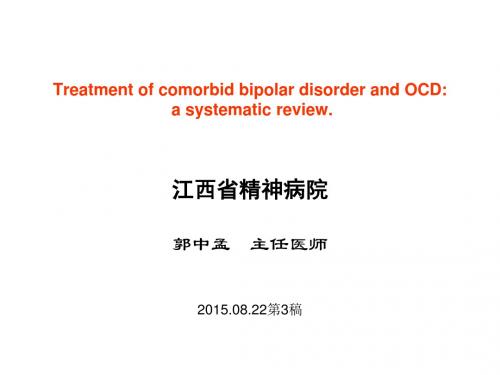
•
9. El-Mallakh RS, Hollifield M. Comorbid anxiety in bipolar disorder alters treatment and prognosis. Psychiatr Q. 2008;79:139-150.
• 重要的是准确诊断BD与OCD共病。 • 因漏诊OCD可能会增加护理的成本。 • 一旦做出双重诊断,有效的治疗可能成为 一个挑战[10]。
Treatment of comorbid bipolar disorder and OCD: a systematic review.
江西省精神病院
郭中孟 主任医师
2015.08.22第3稿交流提纲• • • • • • • 共病的定义 双相障碍共病精神障碍 BD-OCD共病流行学 BD-OCD共病的预后 BD-OCD共病的治疗问题 临床要点 小结
Findings
• 本次分析共纳入了北美、欧洲、澳大利亚、南美及亚洲的40项研究、 14,914名个体。结果显示: △ 双相障碍患者共病焦虑障碍的终生患病率为45%(95% CI 40–51); △ 来自5项研究的1,378名双相障碍个体与56,812名对照的直接比较显示, 前者罹患焦虑障碍的风险为后者的3倍以上(风险比 [RR] 3.22 [95% CI 2.41-4.29]); p<0.0001); △ 来自13项研究、4270名双相 I 型及1939名 II 型患者的比较显示,两 种双相亚型终生罹患焦虑障碍的风险并无显著差异(RR 1.07 [95% CI 0.96–1.20]; p=0.223)。 • 研究者得到结论:相比于对照人群,双相障碍患者罹患焦虑障碍的风 险显著升高。因此,除心境症状之外,双相障碍患者的焦虑症状同样 应得到评估。
游戏障碍专家共识解读(郭中孟2019)

(2)药物治疗:目前没有针对游戏障碍具有 临床适应症的药物,但游戏障碍患者可能存在 精神、躯体等健康问题以及共病,需要药物对 症治疗。
(3)物理治疗:目前有少量研究对游戏障碍 患者进行重复经颅磁刺激等干预,以增强大脑 控制功能或降低玩游戏的冲动,但目前仍缺乏 大样本一致性研究。
ห้องสมุดไป่ตู้
2. 康复措施
行为(如无法控制游戏行为的发生、频率、持续时间、终止 时间等),游戏行为成为生活优先事项,尽管游戏造成负面 后果(如人际关系破裂、职业或学业受影响、健康损害等) 仍然无法停止; (2)游戏行为模式可以是持续性或发作性的,并持续12个 月,但如果症状足够严重且满足其他诊断要点,持续时间可 短于12个月; (3)游戏行为模式导致明显的个人、家庭、人际关系、学 业、职业或其他重要功能领域损伤。根据游戏形式不同,游 戏障碍包括在线游戏障碍、离线游戏障碍两种类型。
(4)物质使用障碍鉴别:游戏行为常常与物质使 用(特别酒精)共存,如果同时满足两种障碍的诊 断标准,可以考虑共病诊断。
五、综合干预原则与措施
(一)总体原则
除遵循物质使用及成瘾行为障碍的一般原则外,需 结合游戏障碍的高发人群、疾病特征等进行预防与 干预,坚持预防为主,进行基于证据、符合伦理的 个体化的综合干预措施。
但这些工具也存在诸多局限性,主要包括对于游戏障 碍核心特征定义不一致、对临床状态分界不一致、缺 乏时间维度、症状指征可靠度不足、侧重评估学生群 体等。
因此,WHO正在组织各国专家及合作机构针对游戏障 碍开发普适性较高、标准清晰统一、易用性较好的筛 查评估工具,以帮助医务人员及早识别游戏障碍的患 病风险,减少漏诊、误诊或过度诊断,促进疑似患者 及高风险个体及早转介到专业机构进一步诊断评估。
探讨丁螺环酮对强迫症的治疗效果

探讨丁螺环酮对强迫症的治疗效果强迫症(OCD)是一种常见的焦虑障碍,其主要特点是反复出现的强迫观念和强迫行为。
据统计,强迫症的患病率为0.2%~0.4%,严重影响患者的生活质量和社会功能。
目前,强迫症的治疗方法主要包括药物治疗、认知行为疗法和手术治疗等。
其中,药物治疗是强迫症治疗的主要手段,而丁螺环酮作为其中一种药物,引起了广泛关注。
丁螺环酮(Buspirone)是一种新型抗焦虑药,其主要作用是通过增强大脑中神经递质5羟色胺(5HT)的活性,从而产生抗焦虑和抗抑郁作用。
近年来,许多研究表明,丁螺环酮对于治疗强迫症具有一定的疗效。
1. 调节神经递质平衡:丁螺环酮能够增强大脑中5HT的活性,从而改善强迫症状。
研究表明,强迫症患者的大脑中5HT水平较低,而丁螺环酮的使用可以提高5HT水平,进而缓解强迫症状。
2. 抗焦虑作用:强迫症患者常常伴有明显的焦虑情绪,而丁螺环酮作为一种抗焦虑药,可以帮助患者缓解焦虑情绪,从而减轻强迫症状。
3. 改善认知功能:丁螺环酮还可以改善强迫症患者的认知功能,包括注意力、记忆力和思维能力等,从而提高患者的生活质量和社会功能。
1. 剂量调整:丁螺环酮的疗效可能与剂量有关,因此在使用时需要根据患者的病情调整剂量,以达到最佳疗效。
2. 用药时间:丁螺环酮的疗效可能需要一段时间才能显现,患者需要耐心等待,并在医生的指导下持续用药。
3. 监测不良反应:丁螺环酮可能会引起一些不良反应,如头晕、恶心、皮疹等。
患者在使用时需要密切监测自身的不良反应,并在出现问题时及时与医生沟通。
4. 联合治疗:丁螺环酮可以与其他药物或治疗方法联合使用,以提高治疗效果。
例如,与SSRI类抗抑郁药联合使用,可以增强疗效。
丁螺环酮作为一种治疗强迫症的药物,具有一定的疗效。
然而,患者在使用时需要在医生的指导下进行,并注意药物的剂量、用药时间和不良反应等。
丁螺环酮可以与其他药物或治疗方法联合使用,以提高治疗效果。
在未来的研究中,还需要进一步探讨丁螺环酮在强迫症治疗中的应用价值和最佳治疗方案。
难治性双相障碍(郭中孟译)
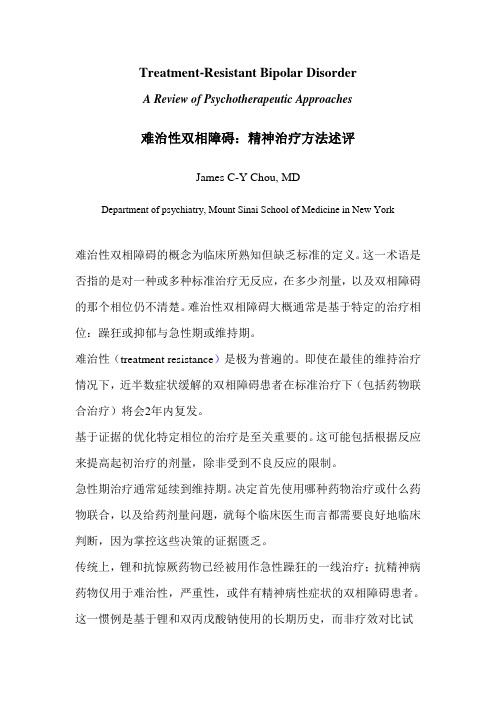
Treatment-Resistant Bipolar DisorderA Review of Psychotherapeutic Approaches难治性双相障碍:精神治疗方法述评James C-Y Chou, MDDepartment of psychiatry, Mount Sinai School of Medicine in New York难治性双相障碍的概念为临床所熟知但缺乏标准的定义。
这一术语是否指的是对一种或多种标准治疗无反应,在多少剂量,以及双相障碍的那个相位仍不清楚。
难治性双相障碍大概通常是基于特定的治疗相位:躁狂或抑郁与急性期或维持期。
难治性(treatment resistance)是极为普遍的。
即使在最佳的维持治疗情况下,近半数症状缓解的双相障碍患者在标准治疗下(包括药物联合治疗)将会2年内复发。
基于证据的优化特定相位的治疗是至关重要的。
这可能包括根据反应来提高起初治疗的剂量,除非受到不良反应的限制。
急性期治疗通常延续到维持期。
决定首先使用哪种药物治疗或什么药物联合,以及给药剂量问题,就每个临床医生而言都需要良好地临床判断,因为掌控这些决策的证据匮乏。
传统上,锂和抗惊厥药物已经被用作急性躁狂的一线治疗;抗精神病药物仅用于难治性,严重性,或伴有精神病性症状的双相障碍患者。
这一惯例是基于锂和双丙戊酸钠使用的长期历史,而非疗效对比试验。
得到FDA批准的非典型抗精神病药物用于双相障碍的使用范围正在扩展;这些药物当前被认为是即使对于适度躁狂患者是一线治疗。
为了快速地减少难治性和提高病情稳定性,必须关注共病,例如物质滥用。
而且,必须停用使病情不稳定的药物治疗,例如抗抑郁药物。
基于证据的加强心理治疗在维持期显然是有益的。
对于确实难治性状况,也推荐氯氮平和电休克治疗(ECT)用于急性期和维持期的抑郁和躁狂治疗。
如果这些治疗失败,有人提出许多新型疗法,而且有一些已经在安慰剂对照试验中得到研究。
OCD治疗实践指南(江西省精神病院郭中孟译)
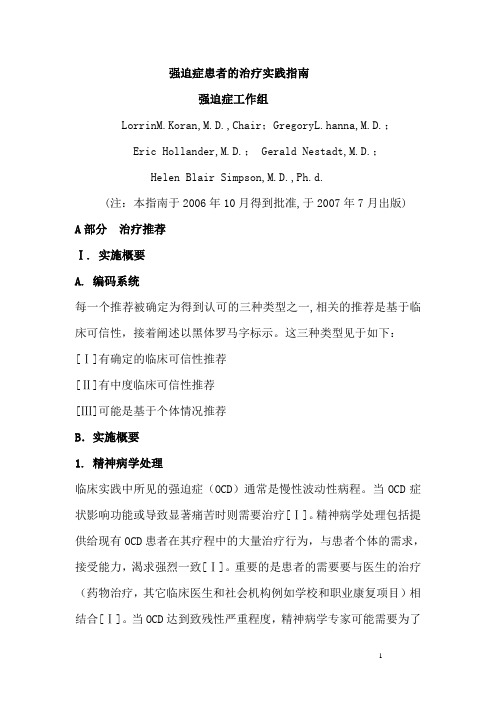
强迫症患者的治疗实践指南强迫症工作组LorrinM.Koran,M.D.,Chair;GregoryL.hanna,M.D.;Eric Hollander,M.D.; Gerald Nestadt,M.D.;Helen Blair Simpson,M.D.,Ph.d.(注:本指南于2006年10月得到批准,于2007年7月出版) A部分治疗推荐Ⅰ. 实施概要A. 编码系统每一个推荐被确定为得到认可的三种类型之一,相关的推荐是基于临床可信性,接着阐述以黑体罗马字标示。
这三种类型见于如下:[Ⅰ]有确定的临床可信性推荐[Ⅱ]有中度临床可信性推荐[Ⅲ]可能是基于个体情况推荐B.实施概要1. 精神病学处理临床实践中所见的强迫症(OCD)通常是慢性波动性病程。
当OCD症状影响功能或导致显著痛苦时则需要治疗[Ⅰ]。
精神病学处理包括提供给现有OCD患者在其疗程中的大量治疗行为,与患者个体的需求,接受能力,渴求强烈一致[Ⅰ]。
重要的是患者的需要要与医生的治疗(药物治疗,其它临床医生和社会机构例如学校和职业康复项目)相结合[Ⅰ]。
当OCD达到致残性严重程度,精神病学专家可能需要为了患者写信给政府机构控制残疾收益方法,政策上为卫生保健提供资金,或政府支持提供住房;或对当局、立法机关、学校或雇主征税[Ⅰ]。
患有OCD的年幼孩子的父母可能需要忠告有关OCD的遗传危险。
对于临床医师来说,重要的是向这些患者解释,可利用的资料显示儿童罹患OCD的患者在增加,但有不过分的危险;患者希望得到更多的信息可能是遗传咨询。
a. 建立治疗联盟建立和保持一种强有力的治疗联盟是重要的,以便治疗是共同性的,并且因此也更有效,更有计划性和更能完成[Ⅰ]。
朝着这一目标的步骤包括调整交流方式来满足患者的需求和接受能力,可以通俗易懂的言语解释症状,以及对患者进行鼓励和安慰。
过分的怀疑是OCD的特征,可能需要特殊的方法来建立治疗联盟,包括允许患者有充分的时间来考虑治疗决定和重复解释(有限的几次)[Ⅰ]。
强迫障碍与CBT(认知行为疗法)心理治疗
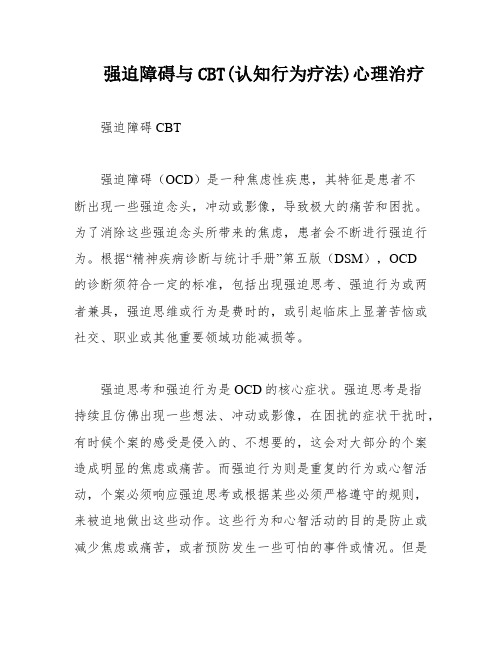
强迫障碍与CBT(认知行为疗法)心理治疗强迫障碍CBT强迫障碍(OCD)是一种焦虑性疾患,其特征是患者不断出现一些强迫念头,冲动或影像,导致极大的痛苦和困扰。
为了消除这些强迫念头所带来的焦虑,患者会不断进行强迫行为。
根据“精神疾病诊断与统计手册”第五版(DSM),OCD的诊断须符合一定的标准,包括出现强迫思考、强迫行为或两者兼具,强迫思维或行为是费时的,或引起临床上显著苦恼或社交、职业或其他重要领域功能减损等。
强迫思考和强迫行为是OCD的核心症状。
强迫思考是指持续且仿佛出现一些想法、冲动或影像,在困扰的症状干扰时,有时候个案的感受是侵入的、不想要的,这会对大部分的个案造成明显的焦虑或痛苦。
而强迫行为则是重复的行为或心智活动,个案必须响应强迫思考或根据某些必须严格遵守的规则,来被迫地做出这些动作。
这些行为和心智活动的目的是防止或减少焦虑或痛苦,或者预防发生一些可怕的事件或情况。
但是这些行为或心智活动,与其期望去抵消或预防的现实状况是不符合和的,或显然是过度的。
OCD的强迫思考的类型包括攻击、怕受污染、性、囤积(或节省)和宗教等。
攻击类型的强迫思考表现为害怕伤害自己或别人,或做出令自己无法控制的事情;怕受污染类型的强迫思考表现为怕脏、怕触摸、怕清洁剂、化学药品等各种污染物;性类型的强迫思考表现为出现不合理的性画面或思考,如对自己的小孩性侵犯;囤积(或节省)类型的强迫思考表现为认为每样东西都很重要,舍不得丢掉,因此堆积很多东西;宗教类型的强迫思考表现为担心冒犯神明,或担心道德上的对错。
XXX是一种有效的治疗OCD的方法。
XXX的基本思想是通过改变患者的思维和行为,来减轻他们的症状。
XXX的治疗过程包括认知重构、暴露和反应防御预防等。
认知重构是指帮助患者识别和改变他们的负面思维模式,以减少强迫思考的出现。
暴露是指让患者面对他们的恐惧和焦虑,并逐渐适应这些情境,以减少强迫行为的出现。
反应防御预防是指帮助患者学会有效地应对强迫念头和行为,以减少其对生活和职业的影响。
酒精使用障碍的药物治疗郭中孟

Follow-up studies on patient groupsappeared from around the 1950’s and described the features of what is currently known as:
Alcohol-induced Psychotic Disorder (AIPD) (APA, DSM-IV-TR 2000; DSM-5, 2013),
1953).
However, these figures did not exclude patients
experiencing psychotic symptoms associated with alcoholwithdrawal
Epidemiology
Whereas the lifetime risk for alcohol dependence is 10–15 %
(males) and 3–5 % (females) (Schuckit 2005), only 2–3 % of
such patients had psychotic symptoms (Victor and Adams
Early descriptions of a distinct psychotic syndrome associated with excessive alcohol use were based on case-studies
and clinical observation.
Bleuler (1916) termed the condition
Conclusions were based on clinical observations and follow-up studies over
OCD

:强迫症-药物治疗进展,针对强迫症,临床习惯使用5-羟色胺回收抑制剂进行治疗,如果效果不满意,再用抗精神病药强化。
强迫症(obsessivecompulsivedisorder,OCD)以反复出现强迫观念和强迫行为为特征,又称强迫性神经症。虽然为神经官能症,但常难治愈,针对强迫症,临床习惯使用5-羟色胺回收抑制剂进行治疗,如果效果不满意,再用抗精神病药强化。本文将综述强迫症的治疗进展。
4.3三线药物当一线和二线药物治疗都无效时,可用静脉注射氯丙咪嗪和反苯环丙胺。艾斯西酞普兰治疗强迫症研究尚少,但可能有效。辅助治疗包括米氮平、奥氮平、奎硫平、氟哌啶醇、加巴贲丁、托吡酯、曲马多、利鲁唑、苯乙肼、圣约翰草和吲哚洛尔。这些药物早期研究已证明有某些功效,但圣约翰草不能与SRIs联合使用。
4.4强迫症不推荐用氯硝安定、去甲丙咪嗪、丁氨苯丙酮、可乐宁、丁螺环酮、锂、纳曲酮,因为这些药物在强迫症治疗中未证明有一致疗效,故不推荐;不推荐辅助吗啡,因为吗啡有滥用潜力,不作为治疗选择。
始量一半的剂量;b这些剂量有时用于快代谢者,常用最大量治疗8周以上无效者,或部分有效且不良反应轻微者;c在服该剂量后12h,应测定氯丙咪嗪加去甲氯丙咪嗪血药浓度,该浓度应保持在500μg/L以下,以降低癫痫发作和心脏传导阻滞危险性。d舍曲林是SRIs中惟一能与食物合用,且吸收较好的药物。e表1数据来自美国,用于中国人时,在后两栏需适当减量
氯氮平的撤药反应(郭中孟20140828)

另外有研究发现,给大鼠服用氯氮平3 周后突然停药3天。 结果发现:纹状体释放DA增加,而服 用氟哌啶醇者则DA减少。 提示氯氮平与其他抗精神病药相比有 着不同的药理学机制,在撤药反应中 更易出现精神症状。
撤药反应的防治
氯氮平的撤药反应发生频率高,症状多样而严 重,我们应尽可能避免撤药反应的发生。 在临床工作中.如需要换药应逐渐减量,并尽 早加用另一种抗精神病药,同时可合用抗胆碱 药; 如撤除长期使用的氯氮平时,应缓慢减量 (50 mg/week) 。至12.5—25mg/d后 方可停药;医嘱患者及其家属不能擅自减药和 停用氯氮平,还应告诉撤药反应不是成瘾或依 赖。
②精神病性症状:出现率为80%,大多为 消失的精神症状重现。病情恶化,有的还 出现新的精神症状,故有“超敏性精神病” 之称。 部分患者的精神症状表现,比氯氮平未治 疗前更为严重。不过,真正意义上的“超 敏性精神病”,应该是新出现的精神病性 症状。
③意识障碍:出现率为10% 表现为定向障碍,言语零乱,片断的 幻觉、妄想,行为紊乱,并有昼轻夜 重的特点,大多呈谵妄状态。 ④情感症状.约占2/3 ,表现兴奋话 多,情绪易激惹、冲动、焦虑、抑郁 等。
NE能功能亢进:出现焦虑、坐立不安、兴 奋、心率加快、失眠、激惹性增高、冲动 性攻击、幻觉妄想等症状; 5一HT2A和5一HT2C受体超敏:出现焦虑、 抑郁、易激惹等情感症状; 中脑-边缘系统DA受体超敏致精神病性症状 再现和出现新的精神病性症状; 某些症状如失眠、胃肠道症状、情感症状 等是多种神经功能相互作用或共同作用的 结果。
一旦出现撤药反应,对于轻者可按既定的治疗 方案用药,重者则必须重新使用氯氮平。 据报道用氯丙嗪、氟哌啶醇等抗精神病药和电 休克等治疗氯氮平的撤药反应,效果都不满意, 而继续使用氯氮平则在1~3周后症状逐渐消失, 尤其是停药后的谵妄,在续用小剂量氯氮平后 迅速缓解,这也符合撤药反应的病理生理机制。
【推荐】OCD治疗的几个问题(江西郭中孟)(可编辑修改)

Review Criteria
A MEDLINE search for all studies till December 2006 assessing the efficacy of pharmacotherapies in OCD was performed .
Use the key words 'pharmacotherapy', 'drugs', 'SSRIs', 'treatment' and 'obsessive-compulsive disorder'. For obtaining data on augmentation strategies and refractory OCD, we used additional key words 'augmentation', 'adjunctive', 'refractory' and 'resistant'.
改善精神障碍患者认知功能的方法(郭中孟)
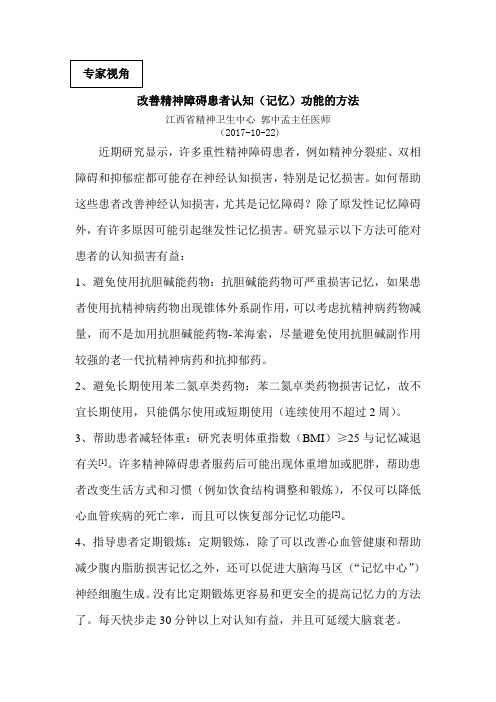
改善精神障碍患者认知(记忆)功能的方法江西省精神卫生中心郭中孟主任医师(2017-10-22)近期研究显示,许多重性精神障碍患者,例如精神分裂症、双相障碍和抑郁症都可能存在神经认知损害,特别是记忆损害。
如何帮助这些患者改善神经认知损害,尤其是记忆障碍?除了原发性记忆障碍外,有许多原因可能引起继发性记忆损害。
研究显示以下方法可能对患者的认知损害有益:1、避免使用抗胆碱能药物:抗胆碱能药物可严重损害记忆,如果患者使用抗精神病药物出现锥体外系副作用,可以考虑抗精神病药物减量,而不是加用抗胆碱能药物-苯海索,尽量避免使用抗胆碱副作用较强的老一代抗精神病药和抗抑郁药。
2、避免长期使用苯二氮卓类药物:苯二氮卓类药物损害记忆,故不宜长期使用,只能偶尔使用或短期使用(连续使用不超过2周)。
3、帮助患者减轻体重:研究表明体重指数(BMI)≥25与记忆减退有关[1]。
许多精神障碍患者服药后可能出现体重增加或肥胖,帮助患者改变生活方式和习惯(例如饮食结构调整和锻炼),不仅可以降低心血管疾病的死亡率,而且可以恢复部分记忆功能[2]。
4、指导患者定期锻炼:定期锻炼,除了可以改善心血管健康和帮助减少腹内脂肪损害记忆之外,还可以促进大脑海马区(“记忆中心”)神经细胞生成。
没有比定期锻炼更容易和更安全的提高记忆力的方法了。
每天快步走30分钟以上对认知有益,并且可延缓大脑衰老。
5、鼓励刺激性活动:把鸟类每天放在装饰的颜色鲜艳、富有刺激性的鸟笼中,要比在普通、无刺激性鸟笼中的鸟大脑增大10%~20%。
同样的原理也适用于人类。
定期采用填字游戏,象棋,西洋双陆棋,拼图,视频,游戏,或接触新的活动刺激大脑,可以帮助成熟海马中产生的祖细胞生长成为完全成熟的神经元。
将身体锻炼(神经生成增殖)与益智锻炼(促进新生神经元生长和成熟)相结合,可以说是提高记忆力的最佳配方[3]。
6、避免使用镇静作用强的药物:某些精神药物,例如氯氮平、氯丙嗪、阿米替林以及氯硝西泮等引起的嗜睡和镇静可以减缓认知过程、损害信息处理和记忆的保存与回溯[4]。
苯丙胺类所致精神障碍的诊治问题郭中孟更新

苯丙胺类所致精神障碍的诊治问题郭中孟更新背景苯丙胺类药物是使用较为普遍的毒品之一,也是一些药物依赖者所常使用的药物。
长期滥用苯丙胺类药物可以导致精神障碍等严重后果。
在医学界,苯丙胺类所致精神障碍的诊治问题一直备受关注。
这里将介绍郭中孟在这方面的更新成果和相关建议。
郭中孟的更新成果郭中孟是一位著名的药物依赖研究专家,他在苯丙胺类所致精神障碍的诊治问题上做出了一些更新的成果。
他提出了以下几点:1. 乙酰化治疗郭中孟提出,采用经典的乙酰化治疗是治疗苯丙胺类所致精神障碍的有效方法。
该方法可以通过增加大脑中乙酰胆碱的量来减轻患者的症状。
实验表明,乙酰化治疗在减轻患者的精神障碍症状方面具有较好的效果。
2. 新型抗精神病药物郭中孟建议,应用新型抗精神病药物是对苯丙胺类所致精神障碍的有效治疗方法之一。
这些新型抗精神病药物具有非常少的副作用,可以帮助患者减轻病症,并提高其生活质量。
3. 综合治疗郭中孟认为,为了治疗苯丙胺类所致精神障碍,必须进行综合治疗。
综合治疗包括物理治疗、营养治疗、社会支持和药物治疗等多种方式的结合,可以更加全面地满足患者的需求。
具体的治疗方案需要根据患者的具体情况而制定。
郭中孟的治疗建议针对苯丙胺类所致精神障碍的诊治问题,郭中孟提出了以下的治疗建议。
1. 认真评估治疗苯丙胺类所致精神障碍的第一步是认真评估患者的具体情况。
通过全面的检查和问诊,评估患者的病情和病因,才能确定治疗方案和药物选择。
2. 营养治疗适当的营养治疗有助于提高患者的营养水平和免疫力,缓解患者的症状。
需要特别注意的是,患者在进行营养治疗时,应避免食用刺激性强的食品,如辣椒、生姜等。
3. 药物治疗选择合适的药物有助于减轻患者的症状。
常用的药物包括新型抗精神病药物和乙酰化剂。
同时,需要根据患者的具体情况调整用药剂量。
4. 心理治疗心理治疗是治疗苯丙胺类所致精神障碍的重要方式之一。
通过心理咨询和支持,可以帮助患者转移注意力和消除紧张情绪。
儿童抽动障碍诊断与治疗专家共识(2017实用版)解读(郭中孟)

DSM-5抽动障碍的诊断标准
短暂性抽动障碍(tic disorders,TD): ①一种或多种运动性抽动和(或)发声性抽动; ②抽动1 d发作多次,几乎每天发作持续时间至少4
周,但不超过1年; ③既往无慢性TD或Ts病史; ④18岁以前起病; ⑤TD症状不是直接由某些药物(如兴奋剂)或内科 疾病(如亨廷顿舞蹈病或病毒感染后脑炎)所致。
4.2.2 教育干预 在对TD进行积极药物治疗的同时,对患儿的学习
问题、社会适应能力和自尊心等方面予以教育干预。
策略涉及家庭、学校和社会。
鼓励患儿多参加文体活动等放松训练,避免接触不 良刺激,如打电玩游戏、看惊险恐怖片、吃辛辣食 物等。
家长应与学校老师多沟通交流,并通过老师引导同 学不要嘲笑或歧视患儿。
表1.治疗抽动障碍的常用药物
治疗方案
(1)一线药物:可选用硫必利、舒必利、阿立哌唑、 可乐定等。从最低起始剂量开始,逐渐缓慢加量 (1~2周增加1次剂量)至治疗剂量。
(2)强化治疗:病情基本控制后,需继续治疗剂量 至少1~3个月,称为强化治疗。
(3)维持治疗:强化治疗阶段后病情控制良好,仍 需维持治疗6~12个月,维持剂量一般为治疗剂量 的1/2~2/3。强化治疗和维持治疗的目的在于巩 固疗效和减少复发。
(4)停药:经过维持治疗阶段后,若病情完全控制, 可考虑逐渐减停药物,减量期至少1~3个月。用 药总疗程为1~2年。若症状再发或加重,则应恢 复用药或加大剂量。
(5)联合用药:当使用单一药物仅能使部分抽动症 状改善,难治性TD亦需要联合用药。
(6)如共患ADHD、OCD或其他行为障碍时,可转 诊至儿童精神∕心理科进行综合治疗。
治疗术后认知功能障碍的药物作用机制

治疗术后认知功能障碍的药物作用机制1. 引言1.1 术后认知功能障碍的临床意义术后认知功能障碍(POCD)是一种常见的术后并发症,特点是手术后出现认知功能下降,包括记忆力减退、思维迟缓、注意力不集中等症状。
这不仅给患者的康复带来困难,也增加了医疗费用和治疗时间。
据统计,术后认知功能障碍在65岁以上的患者中发生率为10%-40%,而在80岁以上的患者中更高达50%-70%。
术后认知功能障碍严重影响患者的生活质量,增加了康复的困难和风险。
患者可能出现焦虑、抑郁等心理问题,甚至导致失能和社会功能下降。
及时有效地治疗术后认知功能障碍对患者的康复至关重要。
药物治疗在缓解术后认知功能障碍中起着重要作用。
通过调节神经递质的水平、减轻炎症反应、促进神经保护和修复等机制,药物可以改善患者的认知功能,减轻症状,提高生活质量。
深入研究药物治疗在术后认知功能障碍中的作用机制,对于指导临床治疗和提高患者的生活质量具有重要意义。
1.2 药物治疗的重要性手术后认知功能障碍是一种常见并且严重影响生活质量的病症,患者常常表现为记忆力减退、注意力不集中、思维迟缓等症状。
在临床上,治疗术后认知功能障碍的方法多种多样,包括药物治疗和非药物治疗等。
而药物治疗作为治疗的重要手段之一,其重要性不可忽视。
药物治疗可以通过干预病理生理过程,改善大脑功能,从而减轻患者的症状和提高生活质量。
针对不同的病理机制和症状表现,药物具有针对性,可以选用不同的药物或药物组合来进行治疗。
药物治疗的重要性在于其可以快速有效地改善患者的症状,提高患者的生活质量,减少疾病的复发和恶化。
在临床实践中,药物治疗已经被广泛应用于治疗术后认知功能障碍患者,取得了一定的疗效。
对于术后认知功能障碍患者来说,及时进行药物治疗是非常重要的,并且在综合治疗方案中占据着重要地位。
药物治疗的重要性在于其可以帮助患者缓解症状、改善生活质量,并为患者提供更好的康复机会。
2. 正文2.1 阿片类药物的作用机制阿片类药物是常用于治疗术后认知功能障碍的药物之一,其作用机制主要是通过作用于中枢神经系统的μ-阿片受体和κ-阿片受体来发挥药效。
- 1、下载文档前请自行甄别文档内容的完整性,平台不提供额外的编辑、内容补充、找答案等附加服务。
- 2、"仅部分预览"的文档,不可在线预览部分如存在完整性等问题,可反馈申请退款(可完整预览的文档不适用该条件!)。
- 3、如文档侵犯您的权益,请联系客服反馈,我们会尽快为您处理(人工客服工作时间:9:00-18:30)。
Introduction
Obsessive-compulsive disorder (OCD) is a chronic, waxing and waning neuropsychiatric disorder characterised by obsessions and compulsions. Obsessions are recurrent and persistent thoughts, images, or impulses that are irrational, unwanted, excessive or inappropriate. They are intrusive and cause significant anxiety or distress. As they are unwanted, the individual attempts to ignore or resist such thoughts and neutralise them with some other thoughts or action. Although the obsessions are unwanted, they are recognised as a product of his or her mind and not imposed from without. Compulsions are repetitive behaviours or mental acts often performed in response to obsessions or according to rigid rules. They reduce the distress associated with obsessions. Compulsions are often performed to prevent some dreaded event although they are not connected realistically to what they are designed to prevent and are clearly excessive. The obsessions and compulsions can be extremely time consuming, often taking up many hours of a person's day leading to considerable distress and interference in functioning. Following are the common obsessions and compulsions reported by the patients.[1,2]
Diagnosis of OCD
A diagnosis of OCD is made if obsessions and/or compulsions are present and cause marked distress, are time consuming (more than 1 h per day), or significantly interfere with the person's routine social and/or occupational functioning.[3] Most patients with OCD have good insight in to their illness and perceive that obsessions and compulsions are unreasonable or excessive. However, DSM-IV field trial has demonstrated that nearly a third of OCD patients have poor insight.[4] To reflect the findings of the field trial, the DSM-IV added a new OCD specifier: 'with poor insight'. Insight may also vary across situations and times. For example, a person may recognise the unreasonableness or irrationality of contamination fears while discussing with the therapist in his office, but may exhibit poor insight when actually performing compulsions because of excessive anxiety. Insight could be poor in children with OCD because they may lack sufficient cognitive maturity to make this judgment. In essence, although good insight into symptoms is characteristic of OCD, a substantial minority of patients may also have somewhat poor insight. It is important to recognise this because many OCD patients with poor insight are often misdiagnosed as 'psychotic' and treated inappropriately with antipsychotic drugs.
Issues In The Pharmacological Treatment of Obsessive-Compulsive Disorder
S. B. Math; Y. C. Janardhan Reddy Int J Clin Pract. 2007;61(7):11701180
outline
Obsessions
பைடு நூலகம்
Fear of contamination (dirt, dust, sticky substances, etc.) or contracting an illness. Doubts about daily activities (e.g. whether the door is locked or not, whether the gas knob is turned off or not). Thoughts, images or urges related to sex (sexual thoughts and images about immediate family members), harm (urges to harm self or others e.g. fear of stabbing one's child) and religion (thoughts of blasphemy e.g. urges to abuse God). Need to arrange items in a particular order. Fear of getting an illness (e.g. AIDS, hepatitis, rabies etc.). Hoarding
Review Criteria
A MEDLINE search for all studies till December 2006 assessing the efficacy of pharmacotherapies in OCD was performed . Use the key words 'pharmacotherapy', 'drugs', 'SSRIs', 'treatment' and 'obsessive-compulsive disorder'. For obtaining data on augmentation strategies and refractory OCD, we used additional key words 'augmentation', 'adjunctive', 'refractory' and 'resistant'. In addition, the reference sections of major articles, and reviews were also screened. We employed the usual hierarchy of evidence to write the review. Systematic reviews and meta-analyses of randomised controlled studies (RCT) were considered the best evidence base followed by RCTs, open-label studies, case series and case reports. In addition, we also considered clinical guidelines and narrative reviews in writing this educational review.
Compulsions
Washing and cleaning (e.g. hands, utensils, clothes, floor etc.). Checking (e.g. door locks, electrical outlets, gas knobs etc.). Repetition (e.g. counting money, tracking accounts, rewriting, rereading etc.). Arranging and ordering things (books, clothes etc.). Hoarding of useless items (e.g. old newspapers, magazines, pens, bottles etc.). Mental rituals or compulsions (e.g. praying, counting, contrast thinking etc.). Compulsive reassurance-seeking from others regarding their doubts or confirming that they have not committed an inappropriate, or immoral act.
